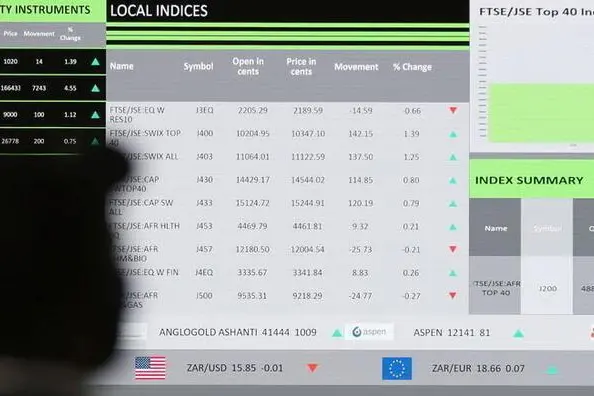PHOTO
Emerging market stocks looked on course for their steepest fall in seven weeks on Tuesday, with Indian shares slumping on nervousness around election results, while political uncertainty continued to weigh on the South African rand.
The MSCI EM equities index fell 1.6%, having dropped as much as 1.9% earlier in the session. The benchmark was set for its biggest percentage drop since April 16.
India's main stock indexes slid more than 5% each, pulling back from record levels hit on Monday, as vote counting trends showed Prime Minister Narendra Modi's alliance was winning a majority of seats in the general election, but well short of the landslide predicted in exit polls.
The updates spooked financial markets which had expected a hefty win for Modi, with the rupee falling to 83.5 per dollar and benchmark bond yields rising.
"The margin of the BJP victory will be less than previously expected. The strong gains on equities and the rupee that we saw yesterday looked very much overdone," said Jon Harrison, managing director for EM macro strategy at TS Lombard.
"The reality is that any new government is going to face a lot of pressure to do more welfare spending and they're going to be constrained in terms of the reforms that they can do."
Stock markets in South Africa, Hungary and Poland also fell as investors considered the prospect that the U.S. economy's "exceptionalism" may be starting to unwind as manufacturing activity there further weakened.
The dollar ticked up on Tuesday following losses overnight, weighing broadly on EM currencies.
The Official Monetary and Financial Institutions Forum said more global reserve managers plan to increase exposure to the now high-yielding U.S. dollar as their interest in China's yuan has soured due to low returns and geopolitical tensions.
The South African rand fell more than 1% to trade at 18.72 per dollar after data showed the economy contracted 0.1% in the first quarter in quarter-on-quarter seasonally-adjusted terms. Economists polled by Reuters had predicted a growth of 0.1%.
The currency was hammered last week after the African National Congress (ANC) lost its majority in last week's election. The ANC has up to two weeks to agree to a coalition pact.
Meanwhile, Tuesday will see Zambia's international bondholders vote through their part of a $13.4 billion debt restructuring and make it the first to complete a full-blown rework under the G20-led 'Common Framework' architecture.
(Reporting by Sruthi Shankar in Bengaluru, Editing by Louise Heavens)




















